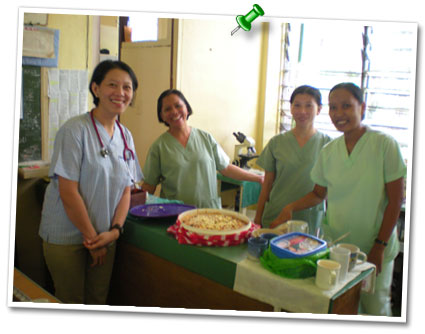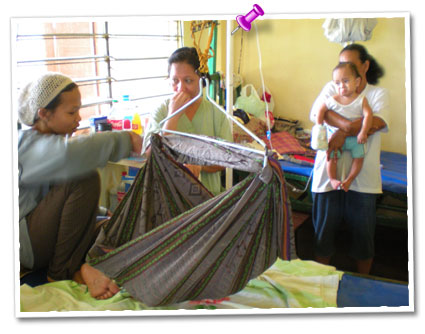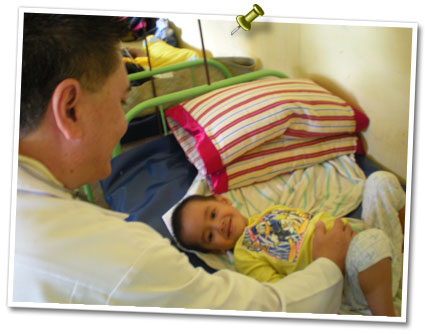
Years ago in the early 1960s the only working hospital in the whole Sulu Archipelago was the provincial hospital in Jolo. The inhabitants either had to go to Jolo for their medical needs or simply died. This absence of medical professionals outside of Jolo, particularly in the Tawi-Tawi islands, prompted the late Bishop Francis McSorley, OMI, to invite the Medical Mission Sisters (a religious congregation of women health professionals) to open a hospital in Bongao in 1968 to provide professional medical services to the people of Tawi-Tawi. The Medical Mission Sisters Loreta De Guzman, Scholastica Los Banos, and Lina Raeldones pioneered the opening of Holy Family Hospital or HFH, a secondary hospital offering appropriate medical and surgical services from 1968 to the present. With the coming of the government hospital in Bongao in the late 1970s, the Holy Family Hospital took stock of the relevance of its continued professional medical services to the poor in the Tawi-Tawi archipelago. This reflection paved the way for a new way of healing presence in the context of its milieu.

The HFH decided to revert to a primary health care facility to be more relevant and rooted in the socio-economic, political and cultural realities of the people of Tawi-Tawi, with preference for the poor. This decision led to a cycle of changes. The hospital has now become part of the community at large and of the Federation of Community Health Organizations known as the Parhimpunan Paghambuukan ha Pamaranan sin Kauman (PPPK) composed of community health workers and members from 8 barangays. The Federation's vision was to pursue a common dream of the "establishment of an alternative health care system by the people, for the people, and of the people." In 2003, the Medical Mission Sisters turned over to the PPPK the management of the Holy Family Hospital, one of the first hospitals managed by an organization largely composed of poor Muslim communities, mostly Muslim housewives, and their leaders. Today the Holy Family Hospital is a part of the larger Federation of Community Health Organizations (PPPK) and HFH continues to serve the people of Tawi-Tawi and the poor communities, in particular, through its quality health care services and excellent staff. The Hospital is unique in the country not only for the quality training to the local staff but also for the integration of the community health programs in the 8 barangays. For most health workers in the hospital and in the federation, the Holy Family Hospital stands for three things: First, HFH stands for the development of a holistic and alternative health care system that is responsive to the needs of the people especially the majority poor. Second, the set up of the HFH allows the staff and workers to experience how patients should be treated when they seek medical attention and help. In the HFH, patients are attended immediately upon the evaluation of the physician or staff on duty without asking the patients if they have money for deposit or advance payment. The staff on duty sees to it that the much-needed tender and loving nursing care is given equally to all, regardless of patient's capacity to pay. Health education is an integral part of the professional services that the hospital gives. The staff shares their knowledge and skills to the patients so they have the necessary knowledge for preventing diseases when they go back to their respective communities. Verily, the patients are not only treated, but they too are empowered! To many of the health workers, the actual experiences in the HFH leads also to personal healing, especially of the many biases towards hospitals and medical professionals. To them the HFH is an experience of healing and helping save people's lives. Third, the vision of the HFH promotes good relationships between Muslims and Christians in the province. Friendly relations provide occasions to correct negative judgments and impressions about the “otherâ€. In the HFH, the staff, patients and the communities commit to live as friends and both Muslim and Christian events are celebrated hand in hand with respect and understanding. Here are some reflections of the health workers on the healing mission of the HFH:
“I feel very lucky to have been part of Holy Family Hospital for 14 years as I have found it fulfilling to be part of the healing mission of the Vicariate of Sulu and Tawi Tawi's healing ministry and the PPPK (Parhimpunan Paghambuukan ha Pamaran sin Kauman, Inc.†(Ms. Nareza Jumalon, Administrative Officer- Holy Family Hospital)
 “I started serving HFH in 1974. I was trained by Sister Josphine Derequito, MMS. I became one of the nursing staff even I was only a high school graduate. During the years of healing ministry with the Medical Mission Sisters, I learned first hand the nursing process and I had several laboratory training in different centers outside of Tawi-Tawi to identify malaria, see the TB bacilli in the skin for Hansen's disease and in the sputum for pulmonary tuberculosis. I also became part of the facilitating team of the PPPK and we coordinate all efforts of the 7 communities and the more 400 families and 2000 individuals that are part of this program for the people, by the people of the people. Coming from a poor family, I was interested to serve my own people. The Sisters influenced me a lot because I became closer to God. You can say that they were my models and their prayerfulness and dedication to service especially to the poor.â€
“I started serving HFH in 1974. I was trained by Sister Josphine Derequito, MMS. I became one of the nursing staff even I was only a high school graduate. During the years of healing ministry with the Medical Mission Sisters, I learned first hand the nursing process and I had several laboratory training in different centers outside of Tawi-Tawi to identify malaria, see the TB bacilli in the skin for Hansen's disease and in the sputum for pulmonary tuberculosis. I also became part of the facilitating team of the PPPK and we coordinate all efforts of the 7 communities and the more 400 families and 2000 individuals that are part of this program for the people, by the people of the people. Coming from a poor family, I was interested to serve my own people. The Sisters influenced me a lot because I became closer to God. You can say that they were my models and their prayerfulness and dedication to service especially to the poor.†(Helen de la Pena, Supervisor, Personnel Services Dept.) The HFH serves the Badjaos who really are the poorest of the poor. They are the "
nomads of the sea" who, at one time, lived in small boats but now they live in shanties by the coast. Their life is about family and community. A case worth sharing is the ritual of birthing in the Badjao family and community. On one occasion a group of Badjaos came by boats to the hospital bringing a member of their community who was pregnant and in labor. There were about 30 to 40 people with the pregnant mother and they were all excited about having a new baby in their community. The Badjao community excitedly went to the hospital but no one brought the baby's clothes. Neither did they have the financial capacity to buy pampers or clothes for the newborn baby. They were all laughing and in their excitement, they rushed back and forth getting things to help each other with the very little they had. The Hospital provides professional health services to about 5,000 patients annually and in its 40 years have served more than 200,000 individuals. And through the Federation, the HFH ceaselessly confronts the continuing cycle of poor disease-prevention practices, absence of potable water, poor sanitation, and high incidence of water-borne diseases. The endemic nature of malaria and stronger strains of the multi-drug resistant tuberculosis (MDRTB) and Dengue Hemorrhagic Fever contribute to high morbidity and mortality in the archipelago. These are the realities that the HFH faces daily. The hospital has committed and well-trained staff who render professional and loving health services. Their work points to the growing awareness that health and healing services are indeed ministries that are very important in the community. The hospital needs financial assistance for the next five years and Jolo Bishop Angelito Lampon, OMI and Medical Director Dr. Joseph S. Llenado,M.D. are knocking at every door to make the Holy Family Hospital in Tawi Tawi survive. What are truly amazing are the courage and the undaunted spirit of the people in the HFH and the Federation. In their hardship and want, they continue to dream, looking for a day that they would modernize the hospital and train more health personnel and community workers. They believe that with modern technology and facilities, the hospital can serve the poorest of the poor with quality health care and services. The hospital needs urgently a basic laboratory to diagnose infectious diseases like malaria, tuberculosis, and water borne diseases. It also needs a small X-ray machine. Are there any generous souls out there?





